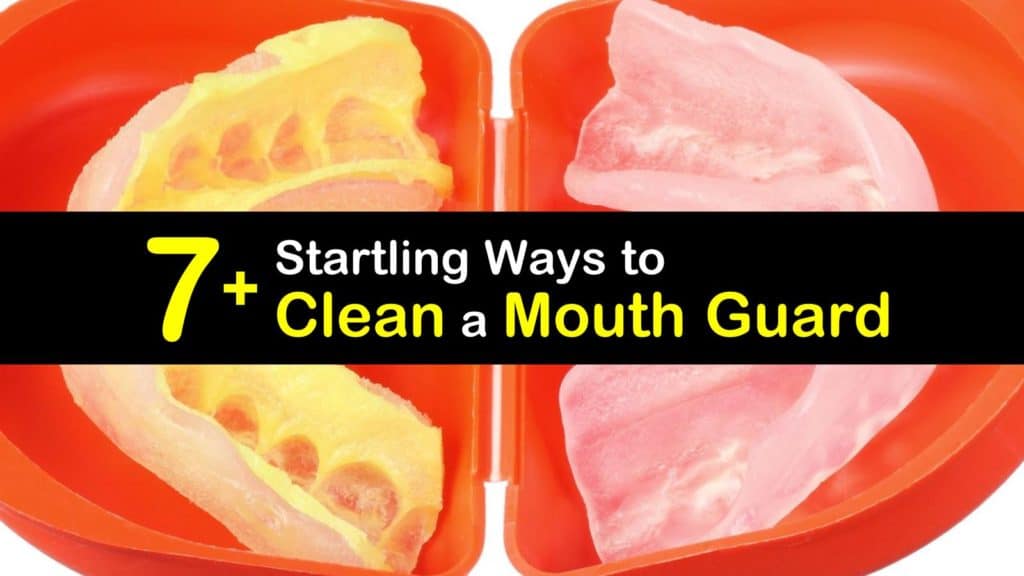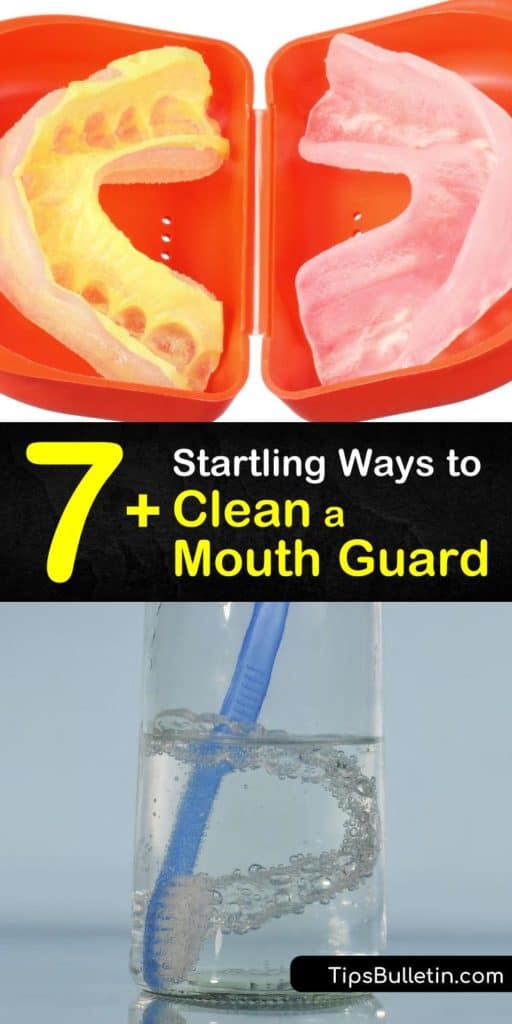It is essential to understand why proper mouth guard care is necessary and know how to clean a mouth guard to avoid bacterial growth and plaque buildup. Cleaning your mouthguard should be part of your regular oral health care routine each day.
Mouth guards are useful tools for protecting one’s teeth and jaws during contact sports like hockey, lacrosse, and football.
Many children and adults use a night guard to shield their mouths from teeth grinding and clenching while asleep (sleep bruxism), which can be detrimental to the teeth and jaw and cause headaches. Using a night guard also helps to diminish snoring and alleviate sleep apnea.

Cleaning a Mouthguard
If you have any children who need to use a mouth guard, night guard, or retainer, encourage them to practice good oral hygiene, including having a thorough understanding of how to clean a mouth guard.
Read on to find out the best way to clean a mouth guard, sports guard, or nightguard.
It’s important to learn how to clean a night guard or mouth guard so it lasts as long as possible. It is best if you always clean your mouthguard in between each use. Otherwise, you start to see a noticeable buildup of calcium, plaque, bacteria, and unpleasant odors.
It may seem like a lot of unneeded effort at first, but once it becomes part of your routine, you’ll find that it’s not complicated. Cleaning a mouthguard, retainer, and other oral appliances regularly is crucial for supporting your teeth for as long as possible.
Consistently brush and rinse your teeth before and after wearing a mouthguard to help remove food particles, bacteria, and dental plaque remaining in the mouth so that they don’t spread to the mouth guard.
Follow these tips and tricks for cleaning a mouthguard to find what works best for you.
Rinse the Mouth Guard after Wearing
After each use, rinse the mouthguard thoroughly with cool water for at least 20 seconds to remove debris and loosen dental plaque. Rinsing with warm or hot water isn’t recommended as it could warp the mouth guard and cause it to fit improperly.

Brush the Mouth Guard
After rinsing, scrub the mouthguard on all sides with a designated toothbrush to remove any remaining particles or dental plaque.
Most kinds of toothpaste are not suitable for cleaning a mouthguard, as the abrasive toothpaste wears away at the material and might shorten its working lifespan.
Cleanse with Baking Soda
A baking soda cleanser will sanitize your mouthguard. Baking soda kills bacteria and prevents the mouth guard from acquiring pH imbalances that harm the mouth.
Create a smooth paste with one part baking soda and one part water and gently scrub the mouth guard on all sides. Rinse it thoroughly with cool water.
This simple paste also makes an ideal all natural denture cleaner and leaves your teeth shining.
Allow the Mouth Guard to Dry Completely before Storing
Once you have carefully disinfected your mouthguard, place it on a sterilized surface, and allow it to air dry before putting it in the case to prevent harmful bacterial growth.
Avoid using paper or terry cloth towels to dry the mouth guard because they sometimes leave residue behind.
Always Store the Mouth Guard in a Clean Case
To keep it from becoming contaminated while you’re not wearing it, store your mouth guard in a clean and ventilated case.
Keeping your mouthguard on your bathroom counter is not suggested because the humidity and steam in the bathroom can warp the mouth guard over time.
Instead, store your mouthguard on your bedroom nightstand, in your sports bag, or another convenient, cool, and dry location.
Clean Your Case Frequently
Keeping your storage case clean and sterile is just as important as cleaning a mouthguard. Hand wash your case with warm water and antibacterial soap (hand wash or dish soap works well) every 2-3 days and place it on a clean surface to air dry.
Avoid putting the case in the dishwasher, as the hot water warps the plastic. Most dentists recommend that you replace your mouthguard case at least once per year or as needed if it becomes damaged.
Deep Cleaning a Mouthguard
Part of your regular oral health routine should be a deep cleaning of your mouthguard once a week. This process involves soaking the mouth guard in an antibacterial cleaning solution to kill bacteria, viruses, and other microbes.
Always discard the cleaning solution after using it once, and rinse the mouth guard carefully to ensure that no traces of the cleaning solution remain that could potentially irritate your mouth.
Best Way to Clean a Mouth Guard
There are several different options for what is suitable to use to deep clean your dental mouthguard.
Important Note: You should not soak your mouthguard for longer than 30 minutes at a time. Soaking a mouthguard in a cleaning solution for long periods could damage it.
How to Clean a Mouth Guard with Denture Cleaner
Use an over-the-counter denture cleaner for mouthguard sanitization or removing plaque from dentures. Denture cleaner is available for purchase at most pharmacies and grocery stores.
Fill a glass or bowl three-quarters full with cool water. Drop the denture cleaner tablets into the water according to the instructions listed on the product package. Allow the denture cleaner tablets to dissolve in the water completely.
Soak your mouthguard in the cleaning solution for up to 30 minutes. Rinse the mouthguard thoroughly with cool water, then allow it to air dry on a clean surface.
Use Hydrogen Peroxide and Vinegar for Cleaning a Mouthguard
Use a two-step process of soaking the mouthguard in a mixture of cool water with white vinegar, then a combination of water with hydrogen peroxide to sterilize it and to take care of any night guard discoloration and staining.
Mix equal parts water and pure distilled white vinegar in a glass or bowl. Soak the mouth guard in the vinegar solution for up to 30 minutes. Rinse the mouthguard thoroughly in cool water.
Stir together equal parts water and hydrogen peroxide in a glass or bowl. Soak the mouthguard in the hydrogen peroxide solution for up to 30 minutes.
Rinse the mouthguard thoroughly in cool water, then allow it to air dry on a clean surface. Use this simple remedy for how to clean denture stains, too, whether you have a complete set or a partial.
How to Clean a Mouth Guard Diluted Mouthwash
Use your regular mouthwash diluted with water to disinfect a mouthguard. Mouthwash also works well as a daily cleansing rinse for mouth guards.
Mix one capful of mouthwash with cool water in a glass or bowl of water. Soak the mouthguard in the mouthwash solution for up to 30 minutes. Rinse the mouthguard thoroughly with cool water and let it air dry on a clean surface.
Best Way to Clean a Mouth Guard with Bleach
Use a diluted bleach solution to sanitize a mouthguard. Do not soak your mouthguard in bleach solution if you are allergic to bleach. Always use protective gloves when handling bleach.
Combine one part bleach with ten parts of water in a glass or bowl. Soak the mouthguard in the bleach solution for five to ten minutes. Rinse the mouthguard thoroughly with cool water, and air dry on a clean surface.
Specific Considerations to Clean a Sports Mouth Guard
Since you use a sports mouth guard under different and often more strenuous circumstances than you would a night guard or retainer, there are a few extra considerations that you should keep in mind.
If it is improperly cared for, a mouth guard has the potential to quickly become a breeding ground for hazardous bacteria like strep, staph, and mold. Store your mouthguard in a sealed, ventilated case to keep it separate from the rest of the contents of your gym bag.
If your sports mouth guard develops tears, holes, severe dents, or other signs of heavy wear and tear, replace it immediately. These pockets serve as a perfect hiding place for bacteria, and they are easy to miss when cleaning the mouth guard.
For optimal hygiene and fit, replace your mouthguard at the beginning of each sports season. If you notice any changes in the way your mouthguard fits, such as feeling loose or causing irritation to your teeth and gums, replace your mouthguard immediately.
Ensuring that the mouth guard fits appropriately is particularly vital for children whose mouths are still growing and developing.
It is imperative to keep your sports mouth guard, retainer, and night guard clean by following these methods for how to clean a mouth guard.
These oral appliances are helpful tools for protecting your teeth and jaw during contact sports and from the detriments of teeth grinding and clenching during sleep.
Taking proper care of your mouthguard keeps it in excellent working condition and ensures that you can use it for years.

We hope you found this article about the best way to clean a mouth guard informative and helpful, and we would appreciate it if you share this article about how to clean a mouth guard on Pinterest and Facebook with your friends and family.